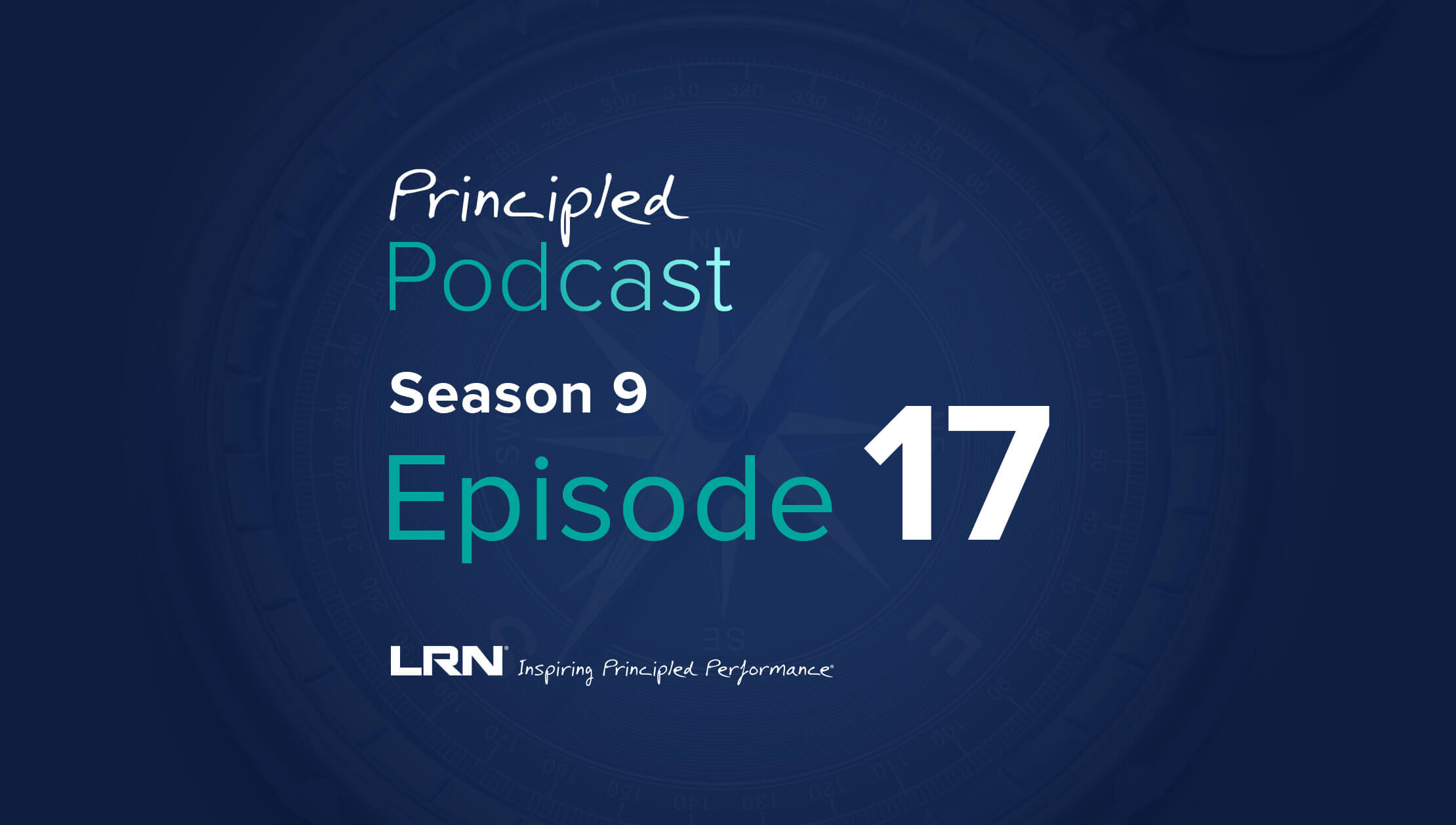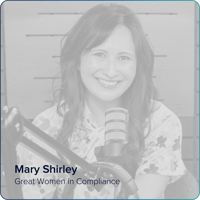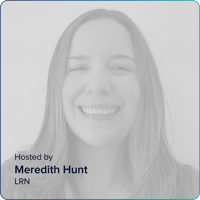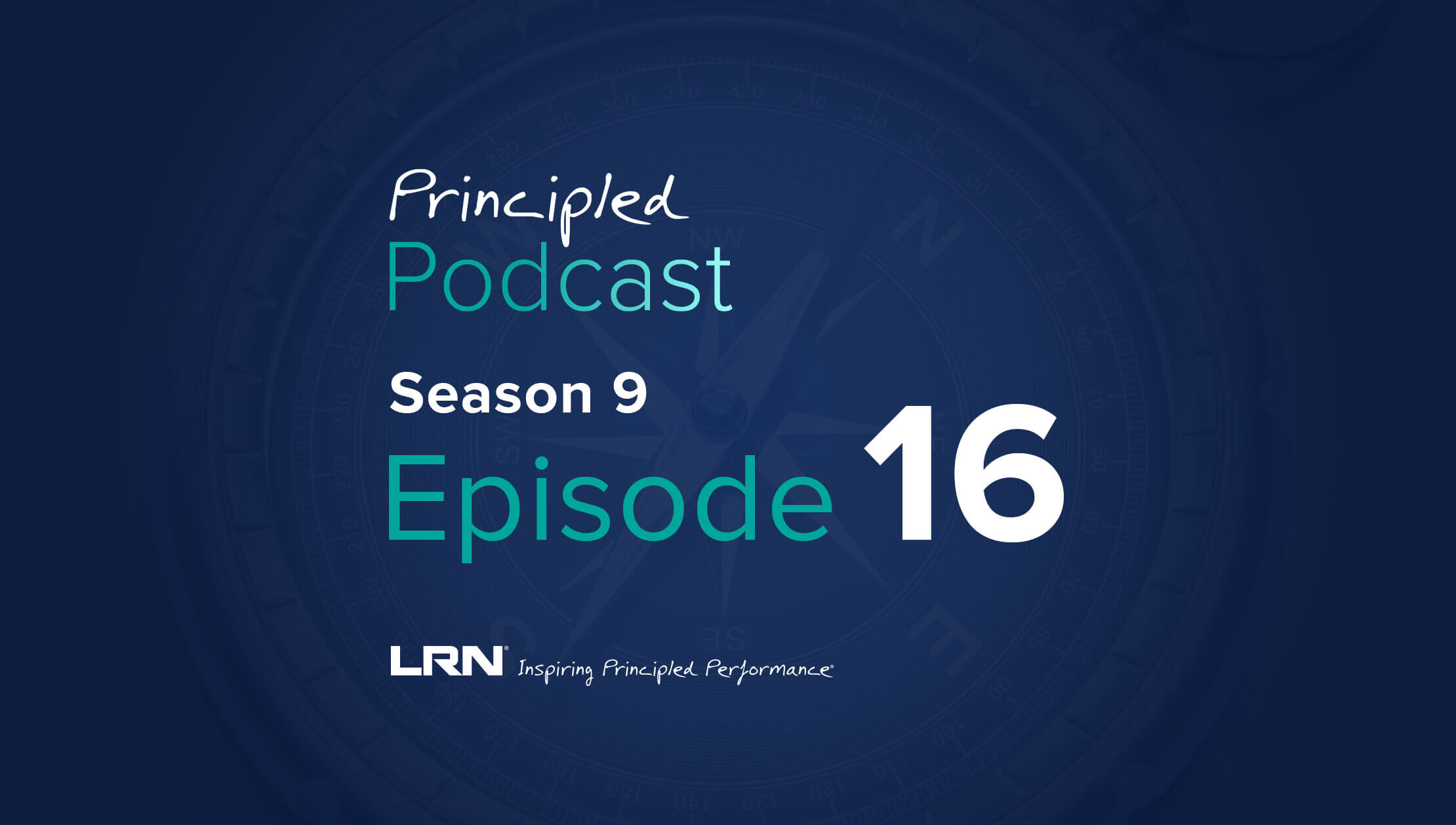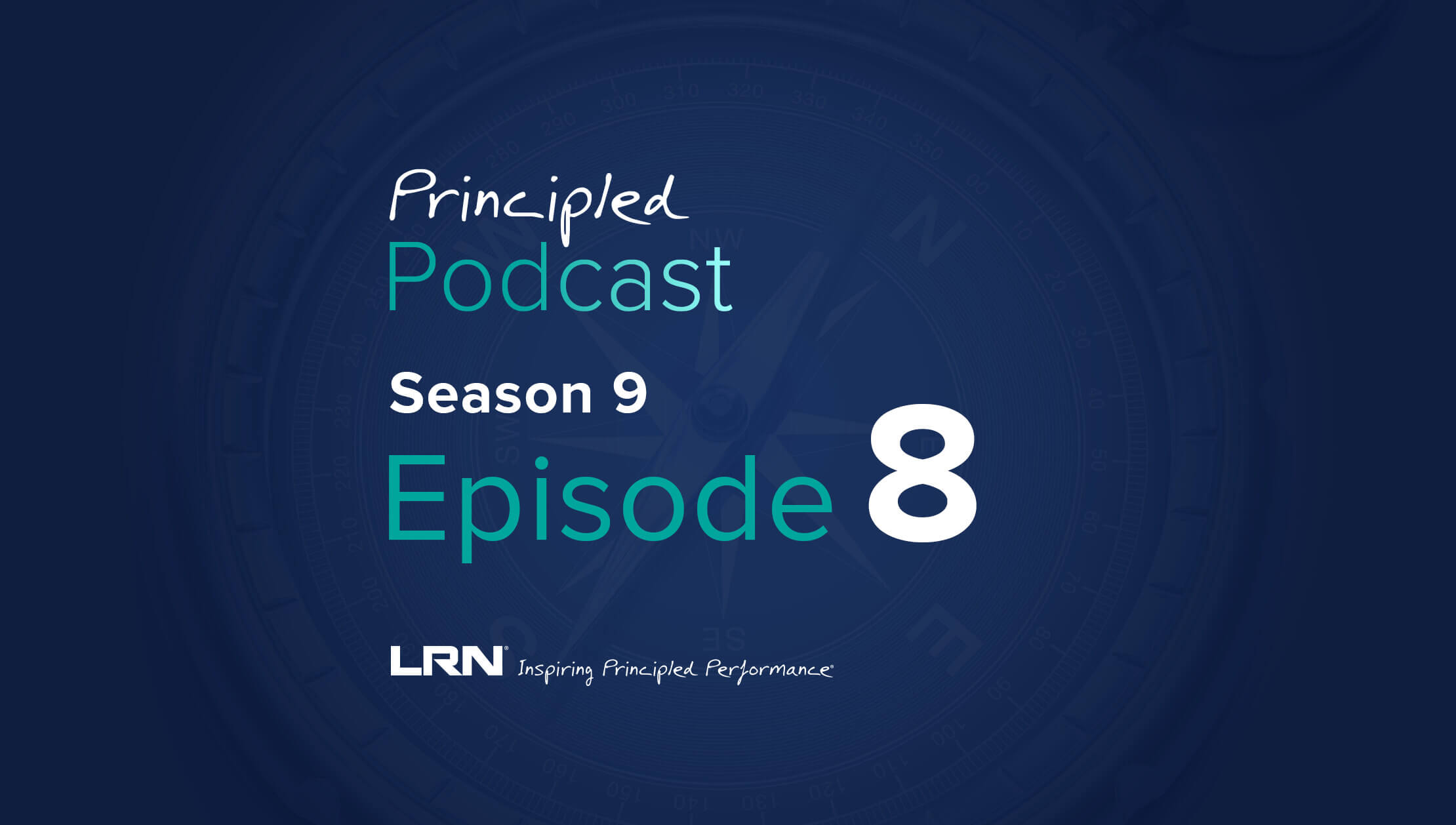What you'll learn on this podcast episode
There are certain people you meet in your professional career that continue to have an impact on you and your industry, long after that initial meeting. For Principled Podcast host Meredith Hunt, that person is Mary Shirley, the former head of Integrity and Compliance Education at Fresenius Medical Care (now head of compliance for Masimo) and co-host of the Great Women in Compliance podcast. On this episode, the two discuss how ethics and compliance professionals can better amplify their peers and build community, using guidance from Mary’s book Sending the Elevator Back Down. They also explore themes from Mary’s upcoming book on how E&C leaders can make the most impact on their programs with limited resources.
Where to stream
Be sure to subscribe to the Principled Podcast wherever you get your podcasts.
Guest: Mary Shirley
Mary Shirley is a New Zealand-qualified lawyer with 18 years of ethics and compliance experience that includes working for data privacy and antitrust regulators, in-house and private practice/consultancy across five countries and four regions of the world.
Mary co-hosts the Great Women in Compliance Podcast, which aims to create a platform for the outstanding achievements of women in the field and sharing ideas and provide learning opportunities for everyone in compliance.
She co-authored the book Sending the Elevator Back Down: What We’ve Learned from Great Women in Compliance (CCI Press, 2020) and has a second book highlighting trailblazing and innovative ideas to level up compliance programs, coming out later in 2023.
She has been bestowed the honor of being named a Compliance Week Top Mind 2019, Trust Across America 2020 Top Thought Leader in Trust, and Excellence in Compliance Awards 2022 Mentor of the Year.
Meredith Hunt came to LRN in early 2023 as a formidable compliance generalist, with experience in quality management, project management, regulatory compliance, policy drafting, and compliance program implementation and management. As a self-proclaimed compliance “nerd,” Meredith works as an ethics and compliance specialist on LRN’s Advisory team. In this capacity, she leads LRN’s code of conduct assessment and benchmarking practice and advises clients on how to incorporate code of conduct best practices. Meredith also manages client projects across a range of industries, including code of conduct development and E&C program evaluations.
Principled Podcast transcription
Intro: Welcome to the Principled Podcast brought to you by LRN. The Principled Podcast brings together the collective wisdom on ethics, business and compliance, transformative stories of leadership and inspiring workplace culture. Listen in to discover valuable strategies from our community of business leaders and workplace change makers.
Meredith Hunt: There are certain people you meet in your professional career that continue to have an impact on you and your industry long after that initial meeting. You seem to move through life in a different way from you, possibly a step ahead, or operating from a vantage point above and with a unique sense for what's coming next.
Hello and welcome to another episode of LRN's Principled Podcast. I'm your host Meredith Hunt, ethics and compliance specialist, working on codes of conduct for our clients at LRN. Today I'm joined by my friend and former colleague, Mary Shirley, former head of integrity and compliance education at Fresenius Medical Care.
She and I worked together before I joined LRN, and I can confirm she's one of my favorite people in the industry. You may know her from her role as co-host of the Great Women in Compliance Podcast, which is distributed on the Compliance Podcast Network just like this one is. Or you may have met her at an industry conference including the SCCE event in Amsterdam, which we recapped with Mary's participation in a recent webinar. Or you may know her from her writing. She co-authored the book, Sending the Elevator Back Down and has another on the Way, which I will let her tell you about. Mary Shirley, thank you for joining me on the Principled Podcast.
Mary Shirley: Thank you, Meredith.
Meredith Hunt: So it's so wonderful to be reunited with you after we work together at Fresenius Medical Care. Would you please introduce yourself?
Mary Shirley: Certainly. Thank you very much, and I'm so pleased and thankful for LRN to have me here today and host this podcast episode. So you can probably tell by my accent if you've not come across me before that I'm not originally a member of Team America, but I'm based in the United States and I am from New Zealand. I studied law there and was an investigator in the areas of data privacy and antitrust before moving to Singapore where I worked for an international telecommunications company, part of the Tata conglomerate, helping to maintain their Foreign Corrupt Practices Act compliance program. And that's where I got my first taste of the FCPA and really loved it.
And for all intents and purposes, I consider myself to be an anti-corruption compliance expert, but have a lot of interest in the ethics and integrity side as well. And thanks to the podcast, also I'm a firm believer in feminist values and the equality of all in our workplaces and in society.
Meredith Hunt: Excellent. I think that's one of the reasons why we've been so drawn together from the beginning. So wonderful to hear that. So you do have a lot of changes going on right now, so I know you're finishing up at both Fresenius and with the Great Women in Compliance Podcast. I know we've talked about this before, it can be really difficult to make big life changes because on the one hand does things ever really perfect.
So we don't want to keep chasing a fantasy, but on the other hand, you don't want to have FOMO and just thinking there's something way better out there for me. So really for me, I always wanted to feel my values are aligned with an employer and that I'm really clear on what the common goals of the organization are. So how do you think about that? How do you evaluate when it's really time to finish up with a project or a role?
Mary Shirley: That's a great question because I think coming to a crossroads in our lives is one of the things that we grapple with the most. We fight to hold on and we fight to let go, and we need to make predictions about which will be the better course for us without the benefit of hindsight. So each scenario comes with its own unique set of considerations, but I thought it would be helpful to go through some of the ones that I think are more persuasive for individuals, particularly in compliance to think about. And before I go into them, I think the first thing I would want to acknowledge is that both for employees and employers, I think the era of loyalty as a prioritized value are over. And I think the word loyalty was somewhat perverted in the past in terms of the fact that it seemed to mean staying somewhere that no longer serves you at all costs. And I think that's insane.
Loyalty is quite a beautiful word, but even when we think of it outside of the workplace and romantic relationships, for example, you wouldn't expect someone to stay in an abusive relationship and accuse them of being disloyal. And so there are certain situations where you are going to feel pushed to the point of leaving and these situations that aren't good for you. And I think it's quite unfair of employers to question loyalty, especially prospective employers to say, "Oh, look, you've been jumping around. I see that as a problem."
In this day and age, it's very normal for people to spend shorter periods of time, and the concept of lifers at organizations are far less common these days compared with even 20 years ago. So I like to believe in being loyal to people, including managers, colleagues, and peers at work. And I think companies often conveniently forget loyalty in times of layoffs. So it shouldn't be a one-way street.
So putting that to this side for one moment, how do you assess when a change is good and timely for you? So I would ask you to consider whether you think your career arc is where you want it to be, and if it's not, if you don't see anything likely to change in the foreseeable future, perhaps it's time to move on.
You no longer have the same passion and energy for a project and it feels more like a chore than something that you're really looking forward to doing as a passion project. This next one is quite a critical one. I mean, it's simply your boss hates you. I have always believed that if you're in a situation where your boss hates you, it is very, very difficult to turn that around. It is perhaps not impossible, but for the most part that is going to be a very difficult situation for individuals to end up coming out on top in those situations.
Another one is that you've realized that you are well below market salary and there are no signs that the company wants to meet market. So an interesting statistic that I'm aware of is that when you change jobs, the average pay increase is 9.7% compared with a 1.7% loss due to inflation if you stay. And that's from the Pew Research Center. And I would say anecdotally what I was told for international listeners, when I was living in Singapore, typically when you change roles there in the compliance space, you can expect a 15% to 20% increase.
Now it has been six years since I've lived in Singapore, so please don't hold me to that if it's not current information. But I think it's a pretty good representation of the difference between staying where you are and battling inflation with relatively small pay increments compared to what happens when you change roles. And finally, if you no longer feel like you're making a positive change within the organization or on others and you're not evolving as a person and a professional, perhaps it's time to consider a more stimulating environment that can afford you more opportunities to advance and touch the lives of others.
Meredith Hunt: Yeah, absolutely. I am in agreement on that. I think there's a lot of factors to consider, right? There's always just a calculation, but thank you. That was really, really interesting. So one of the things that I've been wondering about as well, so I know stepping back from the Great Women in Compliance Podcast is making way for the release of your next book. So what is that about? I don't even know. And what's an [inaudible 00:08:19] you can share with us as a spoiler?
Mary Shirley: Well, thank you so much for asking, and I'm hoping that our conversation will help get the word out. So the concept of the book, what I wanted to work on is, in the knowledge that a lot of compliance professionals do not have a great deal of budget to work with an endless resources, I wanted it to be really practical and have accessible, actionable ideas for your everyday compliance officer. Because what I have found is sometimes I'll attend, say a conference session and someone will talk about how they made a code of conduct app that colleagues can access really easily from their phones. I think, oh, that sounds amazing. Or a company gives us a case study of how they did a massive road show visiting all of their facilities. And inevitably the question comes up of how much did that cost? In the case of the app scenario, the organization told me $300,000, which I did not happen to have spare myself.
And then the question about the roadshow was seemingly there would be a lot of travel costs involved in that, and the organization confirmed that there were. And so I didn't want to be in a situation where I was creating ideas for compliance officers and pushing them, and yet they weren't accessible to 80% of our colleagues. So the focus of the book is on ideas that you can implement with no cost or very low cost, so that you can have bigger impact with limited spending because frankly, we're still in an era where compliance is considered to be a cost center. And where I would like it to be is that we're considered to be the revenue and reputation preservation department instead. But until we get to that day, I think it's best that we focus on achievable outcomes.
So one of the ideas that I have is actually from the former chief compliance officer of Fresenius Medical Care North America who didn't have the fortune of crossing paths with Meredith. Her name is Lisa Estrada. And one of the things that Lisa asked me to do when I took on an operations role in the department was to work on a mission statement for the compliance department.
And at first blush, I sort of thought, oh gosh, that sounds easy, we're going to be able to... how long is a mission statement, right? Like it's going to be super simple to work on and create. And the reality is that it wasn't, because first of all, we had a targeted, like a small workforce that we're working on the statement that was supposed to be representative for the entire department. So we needed to make sure that we consulted adequately with colleagues in the department and then went away as the working group to come up with something that reflected everybody's thoughts and values. And so we ran a series of exercises with the entire department asking people, what do you want? What words do you want to come to mind when people think of us? What color do you most associate with compliance? If there was an animal, what would you suggest would represent our department? Just to help start honing in on symbolism and our shared values and goals together.
And because of what you introduced earlier, Meredith, in terms of what you are interested in that you really like when there are shared values and known and common goals, I chose this tip to share. Because working on a mission statement is really helpful for bringing the department together as a whole to really align on what is it that we're doing and how does it contribute to the company's greater goals, and make sure that they're tied and that everybody's on the same page. And this type of exercise can be a really great team bonding activity.
So running these types of exercises together to see what everybody thinks symbolizes compliance, and then you can use the finished product to take away and put on materials, give to new members of the department. So those who weren't involved coming up with the mission statement in the first place are then able to review it and understand what it means to be a member of that team. So the other great benefit to this, that's I think a very concrete one is if you think about your typical employee engagement survey, which often comes issued from HR, almost certainly one of the questions is going to be for each individual, do you see how your specific job or duties, how do your efforts relate to what the organization does. When you have a mission statement, it is going to be much easier to get favorable scores out of your compliance department when you've already aligned on it with the mission statement.
Meredith Hunt: Yeah, absolutely. No, that makes a lot of sense. And I think it ties together too with the code of conduct work that I do at LRN, really seeing what's the purpose? What are we doing here? What's our goal and what are our shared values? And I would say what we're seeing now to kind of play off what you're talking about is more of an increase in companies wanting to make the codes more interactive, more usable, more accessible for employees. And really that ties again, back to the data that you're going to get from those surveys. And we're really seeing that with the data that we collect on the ethics and compliance program effectiveness is really, really powerful stuff that ties it all together.
So it's not just compliance is here floating in space, and nobody really knows what they do or they're scary or intimidating, really kind of bringing that all back together.
Mary Shirley: The app type work that you have or bringing it more to using the data analytics that you can access, it's a great way to understand when people are spending a lot of time on a certain page of the code of conduct electronically, and you are tracking that data. If they're constantly looking at the gifts, meals, and entertainment threshold or matrix, then you might think, "Oh, people are constantly referring to this. Instead of having them flip through my code of conduct, why don't I make a quick reference infographic or pamphlet about GME that they can have that's separate to the code itself," and that's a more user-friendly way for a compliance.
So I love how you are able to help your clients to gather that important data. And of course, we know about the importance of data analytics, and this is a really easy way in which you can track that valuable information as a compliance department and use it to improve your compliance program for your stakeholders.
Meredith Hunt: Yeah, absolutely. It's all really important. I love how you brought up mission statements and values and really tying that together with everything else that we're all doing, and that is an easy thing, like you said. So couldn't agree more. So I wanted to also move on to what you've done with your Great Women in Compliance Podcast, which is a wonderful podcast with Lisa Fine. What are some of the critical things that you've learned from doing the podcast that you think would be useful for women in our space to really think about?
Mary Shirley: So one of the privileges of being a part of that podcast is getting to meet women who are fiercely ambitious and capable and seeing them rise. So one of the reasons why it's really important for us to have mentors as women is that we need to be able to see where we are going, and we need the trailblazers to be forging the way forward so that the ladies who come behind are able to walk that path with ease.
So the importance I think of that podcast, one of the most critical things to me, and it's why we turned it into a book, has been the concept of sending the elevator back down. No one even comes to mind for me who has been on that podcast who doesn't somehow get involved in the community in some way and give back in other ways. People do tend to be extremely adept at their core subject matter, but they still manage to find time to serve others and to make a difference in the world.
So for anybody looking to make a difference, and if you feel like you are already overburdened, I would tend to agree with you, you probably are. So look for opportunities to serve that aren't necessarily an ongoing time commitment if you don't have the ability to do that. A one-off opportunity, taking someone under your wing to mentor them, offering to help someone out if they're undergoing a challenge either at work or personally that you think you might be able to provide a support for. I think that's the greatest thing, is thinking about how we can be more than just what we do and be a more three-dimensional professional, how we can get involved in employee resource groups, for example. Those have really boomed, I think, during the pandemic, and they can be a great way to serve others and work on something different to your core job as well as cross paths with others in the business that you wouldn't ordinarily come across.
Meredith Hunt: Yeah, absolutely. And I think it's interesting because a lot of smaller organizations don't actually even have ERGs yet, so it's a good opportunity to reach out and just... I myself work remotely 100% of the time. So making that commitment to connecting with my colleagues with virtual conversations and coffee dates and things like that. So that's one way I like to kind of stay connected as well.
So what is your favorite way though, to send that elevator back down to others in compliance? I know you've talked about many ways that you like to do that and that others in the space are doing it, but what is your favorite way?
Mary Shirley: My favorite way is to make a comment every time someone does a great job if I can do that. So attending a conference for example, you might assume that someone who is a fantastic and well-known keynote speaker, they don't need to be told that they're fantastic because they should already know. The thing is that every time you give someone that lift up in that affirmation that they did a great job, no matter how many other great jobs they've got behind them that will lift their spirits that day, that will let them know that their latest piece of work was great, not just every other piece of work prior to that. So you need not be in a senior position to send the elevator back down to someone else. You can be brand new in your career, you can still be a student, you can be an intern and lift up someone who's famous, for example.
So I've written to Adam Grant before. He's an organizational psychologist. To say that-
Meredith Hunt: Oh, I love him.
Mary Shirley: I know, right? That he is awesome. So if you are attending a conference in person, for example, an easy tip that you can do is take a photo of the session and make a social media post and tag the speaker saying, "While the session was fantastic, I learned X, Y, Z," or send the photo to the speaker after the event so that they have something to show their family at the end of the trip or so that they can do a social media post themselves. It's really hard to do a social media post as a speaker about your event if there's no photo of you, and it's really hard to get a photo of you unless you send a selfie whilst you're on the stage. So it's always better if someone gives it to you from the audience.
So that is my tip. No matter where you are in relation to an individual, if you see an opportunity to lift someone up, even if it's just one sentence, if you've never seen them before, just introduce yourself and say what it is that you liked and what the impact was on you. It could have just been as simple as it was entertaining. It doesn't have to be life-changing, but to reach out, send the elevator back down to them simply by saying, "I enjoyed what you said, or your talk, or whatever it was," that's an easy way to send the elevator back down at a public situation and a meeting internally, someone might make a really great point that is agreed to in the meeting and afterwards you can say to the person as well, like either in person or by email. "I really love that point that you made. It was so topical for whatever it is that we've been thinking on." Just letting people know that they've been heard, that it's been appreciated and that it's had an impact on you.
Meredith Hunt: Absolutely. I love that. I've been on the receiving end of that, and I hope that I've helped others by being on the other side of it as well. So thank you. So one other thing I was curious about. So I know there are a lot of people very resistant to going back to work in the official office in person, but despite that sort of trepidation from the employee side, companies are still trending toward that return to the office. But what I've seen too is so even with people returning 100% full-time to the office physically, there's still so many virtual meetings, so it's tough to get your head around being physically there in person, but still being on these virtual meeting colleagues that are all over the world. So do you have any tips on how to bridge that physical divide?
Mary Shirley: Yeah, absolutely. So I think one of the things that really makes sense for teams is to run something that I call the maximizer exercise that's included in my book, and I'd love to give you a sneak preview here on this LRN podcast.
Meredith Hunt: Awesome.
Mary Shirley: So the maximizer exercise is focused on, if you think about those of you who have done the Gant StrengthsFinder, one of the strengths is maximizer and maximizers are people who don't tend to dwell on weaknesses and fix those, rather they tend to identify their strengths and just enhance those to become superheroes with those particular strengths. So the maximizer exercise asks you to think about each of your team members in turn and write them a note with each of their greatest strengths and send them, because a lot of the time we are self-aware about the things that we're good at and not good at, but there are often gaps because people are quite terrible about holistically being self-aware.
So this allows you to get a multi-dimensional perspective of stakeholders that deal with you, and it's almost like a love letter to your colleagues because they're getting pumped up with all of these compliments about what you are absolutely best at. And this type of connection and bond with each other can be particularly powerful with team members that you may not even know if they even like you or not as a person, and suddenly you are hearing all these things that they admire about you.
So this exercise can be run as a bonding activity to help strengthen those bonds that are harder to create when we are virtual and not based in the same office. That can also be used as an activity at your compliance summit, for example, and you can actually do it in person so that when you leave the summit, you go away with those glowing feelings of positivity about each other.
Meredith Hunt: Oh, I love that. I mean, as much as I like a virtual happy hour, that seems a lot more impactful. So I could talk to you all day. I already feel way more inspired than I did at the beginning of this conversation. But thank you so much. We are out of time for today, so thank you. Thank you a million times. Thank you for joining me today. I really can't wait to see what you do next, Mary.
Mary Shirley: Thank you, Meredith. You did an amazing job hosting the podcast today. I know that you've prepared beautifully for it, and it's going to sound great when this goes live. So nice work.
Meredith Hunt: Thank you. So again, this is Meredith Hunt speaking, and I want to thank you all for listening to the Principled Podcast by LRN.
Outro: We hope you enjoyed this episode. The Principled Podcast is brought to you by LRN. At LRN, our mission is to inspire principle performance in global organizations by helping them foster winning ethical cultures, rooted in sustainable values. Please visit us at LRN.com to learn more. And if you enjoyed this episode, subscribe to our podcast on Apple Podcasts, Stitcher, Google Podcasts, or wherever you listen. And don't forget to leave us a review.
Be sure to subscribe to the Principled Podcast wherever you get your podcasts.
